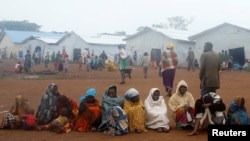The United Nations High Commissioner for Refugees and the Swedish Development Agency have launched a $5 million, four-year program to promote access to financial and nonfinancial services to 100,000 refugees in Uganda.
With pilot projects operating in refugee settlements in northern Uganda, the financial services are geared to help refugees start, build and expand enterprises to meet their daily needs and be more self-reliant.
The Swedish head of development cooperation, Ola Hallgreen, notes that the program provides incentives for private financial institutions to invest in a target group in which they have previously been reluctant to invest.
"There's a lot of unused entrepreneur capacity that will be realized through this program by giving refugees access to credit for business activities, supporting start-ups, facilitating employment — in short, to invest in their own futures," Hallgreen said.
Uganda is home to 1.3 million refugees, the majority of them from South Sudan and other neighboring countries such as Somalia, Burundi, the Democratic Republic of Congo, Kenya and Rwanda.
UNHCR Deputy Representative Mahoua Parums reiterated the U.N. refugee agency's commitment to advocating for refugees, but noted that many financial institutions are still reluctant to lend to refugees because they see them as unstable.
But the program will help refugees get the trust that they have lost, Parums said, as well as the money to "be able to have a dignified life, because they can run their own little business and they will not (have) to always ask to be given food."
'Sustainable' system
The project will be implemented by financial institutions including the Uganda Agency for Development Microfinance.
Hannington Thenge, the agency's business growth and development manager, says the refugees should not misunderstand the project, thinking it is free money.
"They are expected to appreciate that it is a business," Thenge said, "so they have to go through the typical credit requirements. And we are going to enable them learn all these through business skilling. Those who are business-worthy will be supported. They will be expected to pay back. So that this is sustainable."
Eighty percent of refugees in Uganda are women, and 70 percent of the benefits of the program are expected to go to women in farming, handicrafts, catering and trading.




